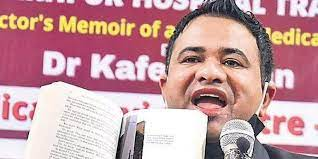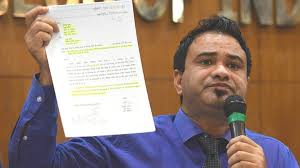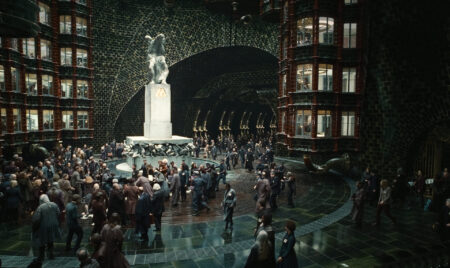In an unexpected twist, the film “Jawan,” directed by Atlee, has incorporated a storyline reminiscent of the heart-wrenching 2017 Gorakhpur hospital tragedy in Uttar Pradesh.
This real-life incident claimed the lives of over 60 children, including 63 infants, when the hospital ran out of liquid oxygen supply. Dr. Kafeel Khan, a pediatrician and former lecturer at Baba Raghav Das Medical College and Hospital, emerged as a heroic figure during the crisis.
He made extensive efforts to contain the tragedy. Still, he was later suspended, arrested, and accused of medical negligence, corruption, and dereliction of duty by the Yogi Adityanath-led Uttar Pradesh government. His subsequent arrest sparked nationwide debates, with many believing it to be politically motivated.
Dr. Kafeel Khan’s Acknowledgment:
Dr. Kafeel Khan, who played a pivotal role in addressing the oxygen crisis during the 2017 Gorakhpur hospital tragedy, has expressed his heartfelt gratitude towards director Atlee and actor-producer Shah Rukh Khan for incorporating a storyline that draws parallels to his own harrowing experience in the film “Jawan.”
The movie, which features Sanya Malhotra in a leading role, revolves around Dr. Irum, who faces a crisis due to the lack of oxygen cylinders in a government hospital, resulting in the tragic deaths of 63 children. Irum is subsequently arrested for dereliction of duty, mirroring Dr. Kafeel Khan’s real-life ordeal.
Taking to social media, Dr. Kafeel Khan conveyed his appreciation for the film’s portrayal of a strikingly similar incident to his own. Although he had not watched the movie, he responded to the numerous messages and comments he received since the film’s release.
In his post, which was written in Hindi, he said, “I haven’t seen Jawan, but people have been sending me messages saying they missed you. There are a lot of differences between the world of movies and the real world. The people who did wrong in the army, health ministry, etc., get punished. But I and those 81 families are still seeking justice. Thank you, @iamsrk sir and @Atlee_dir sir, for bringing up this social issue.”

The Gorakhpur Hospital Tragedy:
The tragic events that unfolded in 2017 in Gorakhpur shook the nation. Over 60 children, many infants, lost their lives in August 2017 after the state-run Baba Raghav Das Medical College in Gorakhpur ran out of piped oxygen supply.
Dr. Kafeel Khan, then a junior lecturer at the hospital’s pediatrics department, went to great lengths to contain the tragedy by procuring oxygen cylinders from various sources to prevent further child deaths.
Initially hailed as a hero, he was later suspended from his post by the Uttar Pradesh government, and the police booked him on charges of medical negligence, corruption, and dereliction of duty.
The arrest and subsequent imprisonment of Dr. Kafeel Khan sparked a national debate, with many supporters believing it to be politically motivated and an attempt to silence a vocal critic of the government.
The Indian Medical Association also released a statement supporting and claiming he was framed. Despite facing attacks, police harassment, and death threats against his family, Dr. Kafeel Khan was released on bail and acquitted in 2019.
Jawan’s Depiction of the Gorakhpur Tragedy:
In “Jawan,” director Atlee and the film’s team have taken creative liberties to present a fictionalized account inspired by the Gorakhpur hospital tragedy. Sanya Malhotra portrays Dr. Irum, a character whose efforts to combat an oxygen crisis in a government hospital parallel the real-life heroics of Dr. Kafeel Khan.
Tragically, in the film as in reality, 63 children lose their lives due to the oxygen supply shortage. However, the film diverges from actual events by ensuring that the perpetrators face consequences for their actions, unlike the ongoing quest for justice in the real-life tragedy.
The Power of Cinema to Highlight Social Issues:
Dr. Kafeel Khan’s acknowledgment of “Jawan” and its striking similarities to his own harrowing experience underscores cinema’s influential role in shedding light on crucial social issues. While the film may offer a fictionalized version of events, it serves as a poignant reminder of the pressing need for justice and accountability in the tragic Gorakhpur hospital incident.
Moreover, it highlights the ability of storytelling in cinema to engage audiences and create empathy, ultimately fostering discussions and driving change.
Conclusion:
Including a storyline resembling the 2017 Gorakhpur hospital tragedy in “Jawan” demonstrates the power of cinema to reflect and comment on real-life issues. Dr. Kafeel Khan’s acknowledgment of the film and his gratitude toward its makers emphasize the importance of bringing such critical social issues to the forefront.
As the film continues to resonate with audiences, it serves as a poignant reminder of the ongoing quest for justice after the devastating Gorakhpur tragedy.













